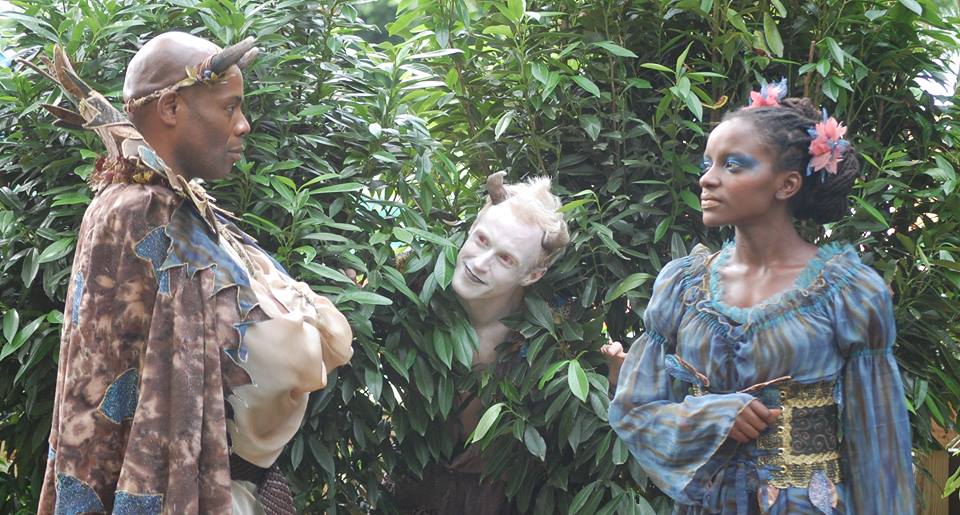Mike Snyder, judah Murdoch, & Will DeVary in The Merchant of Venice. Photo by Kyle Ware.
The Merchant of Venice
By William Shakespeare
Directed by Kyle Ware
Review by Keith Waits
Entire contents are copyright © 2017 Keith Waits. All rights reserved.
The Merchant of Venice has always been a problematic play. For generations, it was performed in a manner to deliberately disparage Jews by characterizing the moneylender Shylock as a mustache-twirling villain, and then somewhere in the last century, the attitude turned so that it began to be commonly performed as an indictment of anti-Semitism.
I think the idea that interpretations can swing in such a wide pendulum gets at the heart of why the work still fascinates. Kyle Ware’s production of a student cast from the summer Globe Players takes a fairly objective perspective on the question, although my own liberal bias might be showing.
The Jewish Shylock (Will DeVary) loans money to Christian Antonio (Mike Snyder), who is actually passing it on to Bassanio (Judah Murdoch). The guarantee on the loan includes, at Shylock’s insistence, “a pound of flesh”, an extreme demand that always makes Shylock a troubling character to connect with. Antonio is confident that three ventures (ships) will return a great profit in more than enough time to allow him to pay off Shylock. He could not be more wrong.
There is also a fairy-tale love story between Bassanio and Portia (Chloe Hill) that turns on a storybook challenge and a masquerade typical for Shakespeare, but Portia gives Shylock competition for the most compelling person in the play.
What did the Bard intend? In their initial negotiation, Shylock points out that Antonio has called him a, “devil”, “evil”, and a “dog”, and that he spit on him in public. Yet does that justify the demand for actual mutilation on a forfeited debt? And when the plot is resolved on such scurrilous logic as is included here, and Shakespeare turns each unfortunate outcome for the Christians on its head for the sake of nonsensical happy endings, the patronizing move only seems to reinforce the callousness of Shylock’s victimization for a modern audience. It therefore becomes anti-Semitic to see Shylock as a villain when his rights as a citizen have not been given equal weight only because he is a Jew.
Or is it possible the audience may still be divided on the question? Will DeVary is very good as Shylock, resolute and unyielding as he is, he is the most morally consistent character, and when he pleads for justice in a following of the letter of the law, only to see that very principle used against him, DeVary seems wrongfully hurt, even as he sharpens the blade he has brought to perform the barbaric penalty. Chloe Hill is also a strong Portia, reminding us that the test of playing the character is her masquerade as a magistrate who turns the tables on Shylock. I also was impressed with Helen Maria Murdoch as her friend Nerissa, who carries off a moment in song with a nice balance of humor and pathos, and Caroline Burzynski is fine in her multiple roles.
Bailey Lomax is a very relaxed but confident Launcelot, who serves Shylock. She moves with great fluidity, detached slightly from the consequences of the plot. But if the female side of the casting equation comes off a little better than the male half, it must be said that Judah Murdoch’s Bassanio is long on charm in his slick suit, but also adept enough at physical comedy to earn his laughs with integrity, Mike Snyder and John Bingman keep the intention of the language clear, and Collin Landrum is an indelible comic figure as Old Gobbo.
Mr. Ware allows some of the supporting players to play a little more broadly with the comedy, but keeps his principals largely on task with the burden of the narrative. His staging is unfussy and direct, although he does have some fun with the contemporary costumes: a messenger enters in bike shorts and helmet, and the two princes that attempt to solve the puzzle necessary to earn Portia’s hand are succinct caricatures of American archetypes.
Those costumes were well managed by Campbell Childers, with a limited sound design from Alex Cooper – I would not have minded a little more of the well-chosen music, and Theresa Bagan’s lights are unobtrusive and smartly directed.
This production technically ends Kentucky Shakespeare’s summer, but they are hosting CenterStage with Kiss Me, Kate (Aug. 1-6) Cincinnati Shakespeare with The Merry Wives of Windsor (July 30 & Aug. 8), and Louisville Ballet with a new, original piece, Lady Lear (Aug. 9-13), not to mention one last visit with The Louisville Improvisors with Late Night Shakes after Aug. 5 performance of Kiss Me, Kate, so there are still plenty of worthwhile reasons to return to Central Park.
The Merchant of Venice
June 26 – 29 @ 8:00pm
Kentucky Shakespeare Festival
C Douglas Ramey Theater at Central Park
Louisville, KY 40202
www.Kentuckyshakespeare.com
Keith Waits is a native of Louisville who works at Louisville Visual Art during the days, including being the host of PUBLIC on WXOX-FM 97.1/ ARTxFM.com, but spends most of his evenings indulging his taste for theatre, music and visual arts. His work has appeared in Pure Uncut Candy, TheatreLouisville, and Louisville Mojo. He is now Managing Editor for Arts-Louisville.com.




